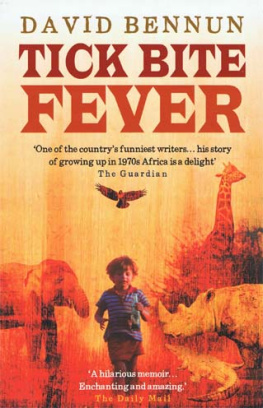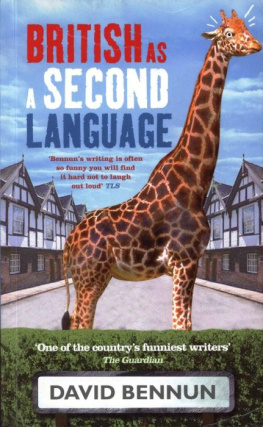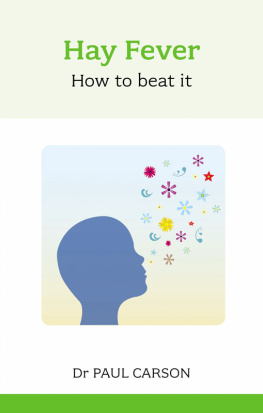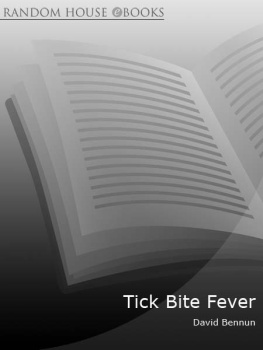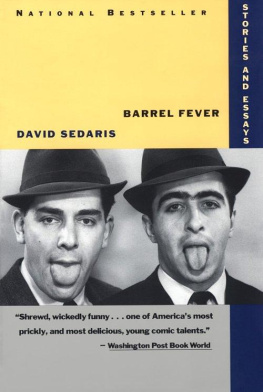David Bennun - Tick Bite Fever
Here you can read online David Bennun - Tick Bite Fever full text of the book (entire story) in english for free. Download pdf and epub, get meaning, cover and reviews about this ebook. year: 2004, publisher: Ebury Press, genre: Non-fiction. Description of the work, (preface) as well as reviews are available. Best literature library LitArk.com created for fans of good reading and offers a wide selection of genres:
Romance novel
Science fiction
Adventure
Detective
Science
History
Home and family
Prose
Art
Politics
Computer
Non-fiction
Religion
Business
Children
Humor
Choose a favorite category and find really read worthwhile books. Enjoy immersion in the world of imagination, feel the emotions of the characters or learn something new for yourself, make an fascinating discovery.
- Book:Tick Bite Fever
- Author:
- Publisher:Ebury Press
- Genre:
- Year:2004
- Rating:5 / 5
- Favourites:Add to favourites
- Your mark:
- 100
- 1
- 2
- 3
- 4
- 5
Tick Bite Fever: summary, description and annotation
We offer to read an annotation, description, summary or preface (depends on what the author of the book "Tick Bite Fever" wrote himself). If you haven't found the necessary information about the book — write in the comments, we will try to find it.
Tick Bite Fever — read online for free the complete book (whole text) full work
Below is the text of the book, divided by pages. System saving the place of the last page read, allows you to conveniently read the book "Tick Bite Fever" online for free, without having to search again every time where you left off. Put a bookmark, and you can go to the page where you finished reading at any time.
Font size:
Interval:
Bookmark:
David Bennun
Tick Bite fever
2003
Tick Bite Fever is the unconventional memoir of a very unconventional childhood. In the early Seventies, Dave Bennuns family transplanted themselves from Swindon to the wilds of Kenya. His father, who was a doctor, had lived in Africa before (but had felt it expedient to leave when the South African government realised he was carting explosives around in the boot of his car for the ANC). For Dave, Kenya was bemusingly new. It would be his home for the next 16 years. In Kenya, the childhood memoir takes on a rather surreal tone! On the way home from school, closed because a pair of lions are padding around the playground, Dave is mugged by baboons. Meet Daves favourite pet Achilles, the almost indestructible dog! Find out about Nairobi snow and the national radio station that only has three records. And read about Dave and his Dad spending happy Sunday afternoons being chased by a herd of elephants. Enchantingly funny, Tick Bite Fever is a tale of the fading innocence of childhood, miles ahead of the competition.
T his ought to contain a long list of thank-yous. It doesnt.
Theres no shortage of people to whom I owe debts of gratitude. But I have to consider the embarrassing possibility that any such list might well outnumber the eventual readership of this book. So Ill keep it brief and hope that nobody takes offence.
Im deeply appreciative of my many friends and colleagues who over the years have supported me in my work; likewise, those editors who have paid me for it and even, now and then, printed it. Thanks to all of you, I have already got away with calling myself a writer for longer than I ever thought possible.
I must single out Ben Marshall and Jon Wilde, great writers and even better friends. If not for their help and encouragement, I might never have attempted a book. Blame them.
Im also very grateful to everyone who has assisted me with the book along the way. Needless to say, any errors, flaws and lapses of judgement are entirely their responsibility, while the good bits are mine alone.
Above all, my thanks and my love go to Kavita, without whom nothing would be worth doing in the first place.
Out of Africa, with Some Relief
A FRICA-BOUND from Heathrow Airport, at 30,000 feet over the Mediterranean Sea, I politely announced that this had all been very nice, but Id like to get out now.
It was 1971. I was three, and already demonstrating the keen pragmatism of a child half my age. Over the next two decades, my understanding of reality failed to improve much.
My parents came to despair of me. What world do you live in? my father would ask, frustrated. It was a good question. We lived in Africa: first, briefly, in Zambia, after that in Kenya. Yet my Africa seemed to be set on an entirely different planet from theirs.
As I grew up, I would come to think of myself as being, by default, African. I didnt look, or sound, or act African, by any stretch of the term. Still, there didnt seem to be an alternative.
I should explain why we were flying to Africa that day in 1971. We were flying to Africa because it was a surefire means to get away from England, where my family had just concluded a spell of nine drab, grey, parochial years. Part way through that spell, I had been born in a place as far from exotic as it is from the equator: Swindon. It wasnt my idea.
To be fair to my parents, it wasnt their idea either. I came as a surprise, and they resolved to make the best of me. I dont doubt that they succeeded, given what they had to work with.
What they had to work with was me, the presumed subject of this book. But the book isnt really about me. It is about Africa, about my family, about the mishaps and calamities and freakish occurrences in which I was so often an unwitting pivot or accidental catalyst. It is about a life my own where I have figured largely as a baffled spectator. Others meet danger with cunning and fortitude; I overcame it through a mixture of blind luck and not falling over too often. My childhood passed in a haze of delirium familiar to me from several intriguing diseases, including the one that provides the books title. Maybe I never fully recovered from it. That would explain a great deal.
I moved back to Britain permanently over ten years ago. Since then, the level of weirdness in my life has dropped to approximately zero. I can tell myself it was all Africas fault, and none of mine. Occasionally, I even believe it. Thats why Ive stayed here in Britain. To keep the weirdness at bay.
When you already have enough weirdness to fill a book, there are only two things to do. The first is to sit tight and hope you dont encounter any more of it. The second is to fill a book.
Family Snapshots
W E ARE never the men our fathers were, my father, Max, once said to me. While I believe he was absolutely right, it would have been easy to take that comment the wrong way. But I know that he was thinking of himself and his own father, Naphtoli, rather than of me.
Naphtoli Toli for short was born in 1904, in Lithuania, into a family of tanners by the name of Misnuner. They ran a leather factory in the country town of Wilkomir, 50 miles to the north of the capital, Vilna. Wilkomir is still there, and so is the factory. The Misnuners are gone. They were massacred in the summer of 1941 along with every other Jew in the vicinity by the German Einsatzkommando 3 death squad and its enthusiastic local collaborators.
Toli eluded this catastrophe thanks only to the earlier misfortune of his father, Yitzchak. One day in 1926, Yitzchak had climbed into a giant tanning drum to clean it out. An employee, unaware, set the mechanism rolling. Yitzchak, as befitted a man who worked with rawhide, was a tough customer. He braced himself against the sides of the spinning cylinder for a full ten minutes before succumbing to dizzy exhaustion, and was tumbled into oblivion.
This left Toli in the charge of his uncles, of which he had several. They decided he should be sent to South Africa. Yet more uncles had set up another leather business in Port Elizabeth, on the Western Cape, where Toli was seconded in a junior capacity. He arrived that same year, a penniless young man with a letter of introduction, a chemistry degree and not a word of English.
By now, the South African branch of the family had shamefacedly changed its name to Bennun, after a rogue Misnuner went doolally and took a pot shot at a colonial governor. While some might see this, in retrospect, as a laudable act of insurrection, it was a grave embarrassment at the time. Our errant relative had not been engaged in a misguided attempt to better the lot of humanity. He was simply mad as a bucket of eels. His aim proved to be no sounder than his wits, but this only made it worse, and the name change fooled nobody. Thats one of those Bennuns who used to be a Misnuner, people would say. Theyre a bunch of lunatics, and they cant even shoot straight.
SIMPLY IN marrying my grandmother, Miriam, Toli showed himself as a young man to be reckoned with. Miriam came from the wealthy, long-settled Silberman clan, whose elders considered Toli no more than an upstart hick a view with which Tolis own uncles less than generously concurred. The only point in Tolis favour was his Lithuanian origin. Had he been a Peruvian a Pole, acronymically nicknamed for the Polish Emigrants Relief Union, the body which assisted Polish Jews in their removal to South Africa he would have settled even further down the social scale.
But Toli was deemed sufficiently base as it was. When he began to court Miriam, the uncles were indignant. They forbade the match, and chose for him a bride better suited to his own lowly station. He married the girl under threat of dismissal from the family business. After a month of unconsummated torment, he consigned the family business to perdition, filed for divorce, booked passage on a Cape Town Castle liner, and eloped with Miriam to Lithuania. There they married, in 1934, on the day Tolis decree absolute was granted.
Next pageFont size:
Interval:
Bookmark:
Similar books «Tick Bite Fever»
Look at similar books to Tick Bite Fever. We have selected literature similar in name and meaning in the hope of providing readers with more options to find new, interesting, not yet read works.
Discussion, reviews of the book Tick Bite Fever and just readers' own opinions. Leave your comments, write what you think about the work, its meaning or the main characters. Specify what exactly you liked and what you didn't like, and why you think so.

